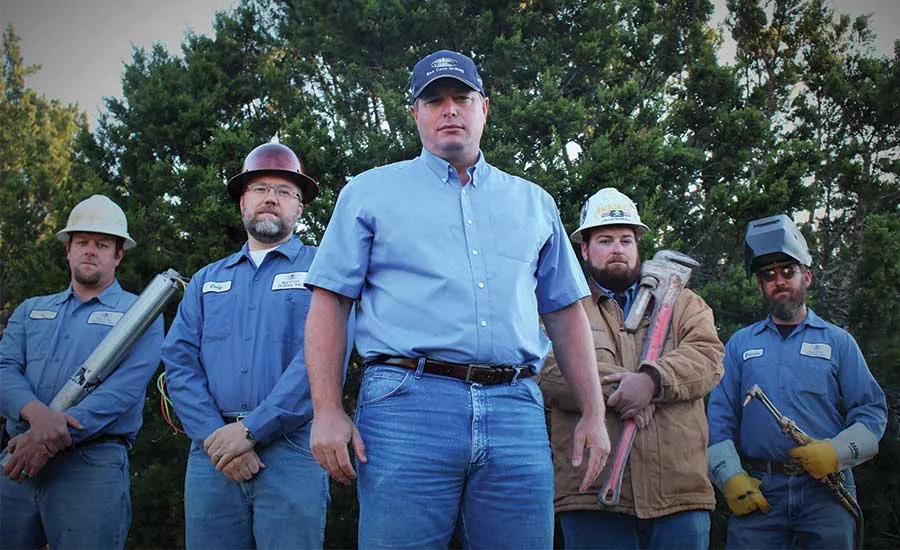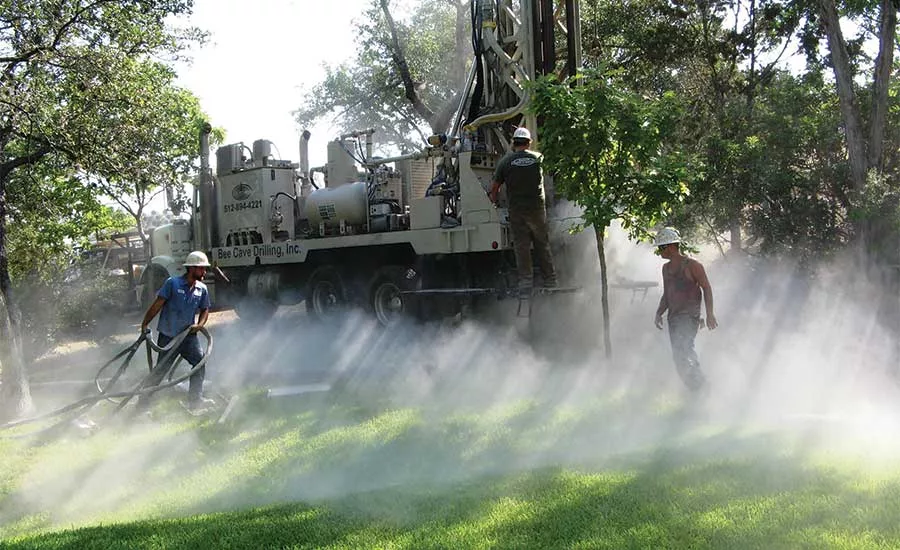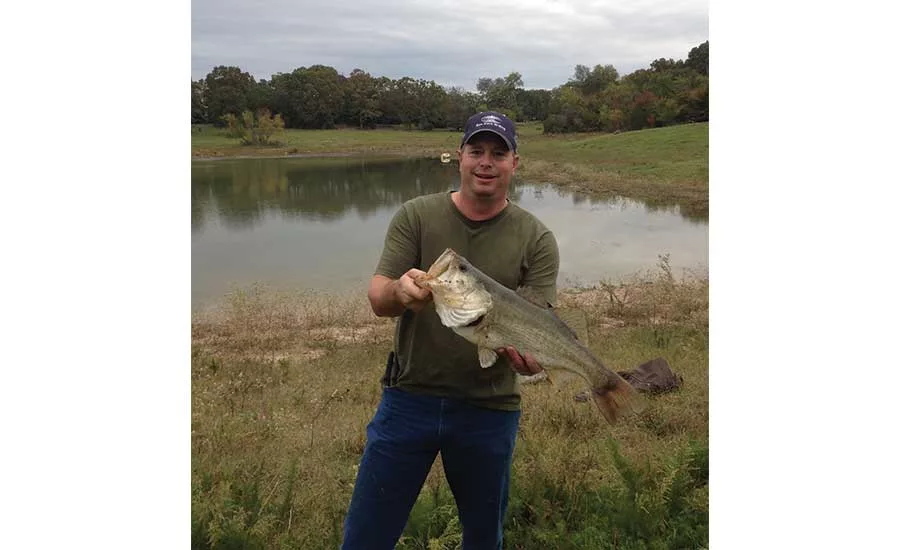You Know the Drill: Faith in Drilling

Bee Cave Drilling in Dripping Springs, Texas, owned by Jim Blair (middle) employs 20 people and adopts new methods to solve challenges.
Source: Jim Blair / Bee Cave Drilling photos


In his spare time, Blair loves to fish, swim and hike with his family.
Source: Jim Blair / Bee Cave Drilling
Sometimes, a career stems from a family tradition. Other times, an opportunity falls into your lap by chance. And, very rarely, it happens out of love.
That’s what happened for Jim Blair, owner of Bee Cave Drilling in Dripping Springs, Texas. Started in 1980 by Rex and Louis Bible, Bee Cave (then known as R&L Pump Service) was a product of Rex’s long family history in water well drilling.
In 1986, Rex had saved enough money to buy a drill rig, which led to him assuming duties in the field, while Lois held down the office. Little did they know, they’d have some additional help just a few years later.
In 1991, Blair moved to Austin to attend the University of Texas. He started dating a girl, and soon after, her dad needed some help with his business. He wasn’t a fan of his path in electrical engineering, so he quit to train under his girlfriend’s dad drilling wells and servicing pumps. His new mentor just happened to be Rex Bible.
In 1993, Blair started working full-time for Bee Cave Drilling. He took over management of the company five years later, then became owner of the company Sept. 1, 2001. And that girl that started it all? Well, she and Blair will be celebrating their 25th wedding anniversary soon — just one of the many blessings Blair says they’ve experienced over the years.
Today, Bee Cave Drilling prides itself on adopting new technologies and methods to improve the overall functionality of water well systems. And Blair prides himself on taking on new challenges, often finding ways to fix a well that’s not functioning correctly or getting a pump out that other companies can’t.
Q. What do you do, and what keeps you coming back every day?
A. I am trying to build a legacy — a business that will stand the test of time. As a second generation well driller, I see the value in passing this business on to family. I am blessed with a family that wants to keep the business running for generations to come. The whole reason I get up every day and go to work is to build a business that they can use to provide for their families. Because I am no longer working for myself, it changes the way I run my business. My main focus is no longer only making money today. But rather, my focus turns to what can I do to build a future. It even changes the way I treat customers. I want to build a relationship with my customers for the future. I focus on building a water system for them that will last for decades rather than years. After all, I want that customer to call my family back when the pump finally does die.
Q. What does a typical workday involve?
A. A typical day starts at 7 a.m. I am at the office right away and focused on getting every job started. Many employees have questions about their assignments and need to discuss the details. After getting the crews lined out, I typically turn my attention to routine jobs. I am talking to clients on the phone, meeting them onsite, ordering materials and tools, interviewing potential employees and visiting jobsites to check in on my crews. I am typically home by 5 p.m. and the phone usually quits ringing about dinner time. Momma likes it when I put the phone down during dinner.
Q. What does it take to succeed in what you do?
A. To succeed in my line of work, I need faith … faith that the equipment won’t break down, and if it does, faith that the mechanic can fix it and the checkbook can cover it. I also need faith that the supplier will get us the parts we need in time. I need faith that the young person I just put in a million dollar rig won’t wreck it on the way to the jobsite. I need faith that the customer is going to pay when the work gets done, even if I didn’t hit that gusher. All of that rarely goes right, so ultimately I need faith in God to remind me that my time here on Earth is not about myself. It’s about Him. As I learn to lean on Him, all the things that I fight on a daily basis get easier.
Q. What do you wish you knew when you started?
A. I wish I had more education in business. I went to school for electrical engineering and that has only helped a little with my work. Most of my duties involve running a company and sometimes I feel completely unprepared for that task. Looking back at the early years, I had no idea that this would be necessary. Today, I am pushing my children to get an education in business, so they can help me run this company.
Q. What tool can you not imagine working without?
A. The obvious answer to this question is usually technology. But I can remember a day when I didn’t have a cell phone. I remember begging my mother-in-law to let me buy a computer, so we could quit doing the books on spreadsheets. I am not talking about Excel or even Lotus 123. I am talking big pieces of paper that came in a binder where she wrote down every transaction. The one thing I can say about technology is that it isn’t a necessity. I can do business without it. But, one tool I can’t do my job without is a pocket knife. I can’t leave my house without it. There is always a package to open (don’t get me started on the new packaging these days), wire that needs to be stripped back, or a locked door to a pump house that needs to be opened. My little pocket knife gets me out of more jams than you can imagine.
Q. What’s the best piece of advice you’ve been given?
A. About 15 years ago, I had a customer tell me to raise my prices. He said that I should be more proud of the great work that I am doing and that I should charge more for it. It took me about five years (and nearly declaring bankruptcy) to get the nerve to try it. I was concerned that my clients wouldn’t be willing to pay more for what appears to be the same service. He said that they would, as long as I backed it up with the best products and service that I could provide. I had my back against a corner and I had no other choice but to try this. It was kind of like lighting a cherry bomb and flushing it. I winced as I waited for the bomb to go off. It was either going to be a spectacular explosion or a great big thud. Over the next few years, I watched as my customers embraced the new service and were willing to pay extra for it. It is now my goal to always keep the quality of my products and services at a superior level.
Q. How would you describe the present state of the industry?
A. Our industry has never had more demands. We need water to feed a growing population. I think that the biggest challenge we have is bringing new troops into our forces. We need to do a better job of recruiting and training the well drillers of the future. Our education system is telling students that they need to grow up to be doctors and lawyers, but I think we have too many of each right now. We need electricians, mechanics, plumbers and well drillers, as well. There should be no shame in putting on muddy boots each day and coming home coated in Kopr-Kote. There should be no shame in sitting at the dinner table, picking the PVC glue off working hands. Our industry has plenty of customers; we just need more young men and women to help us build the water systems of the future.
Looking for a reprint of this article?
From high-res PDFs to custom plaques, order your copy today!





